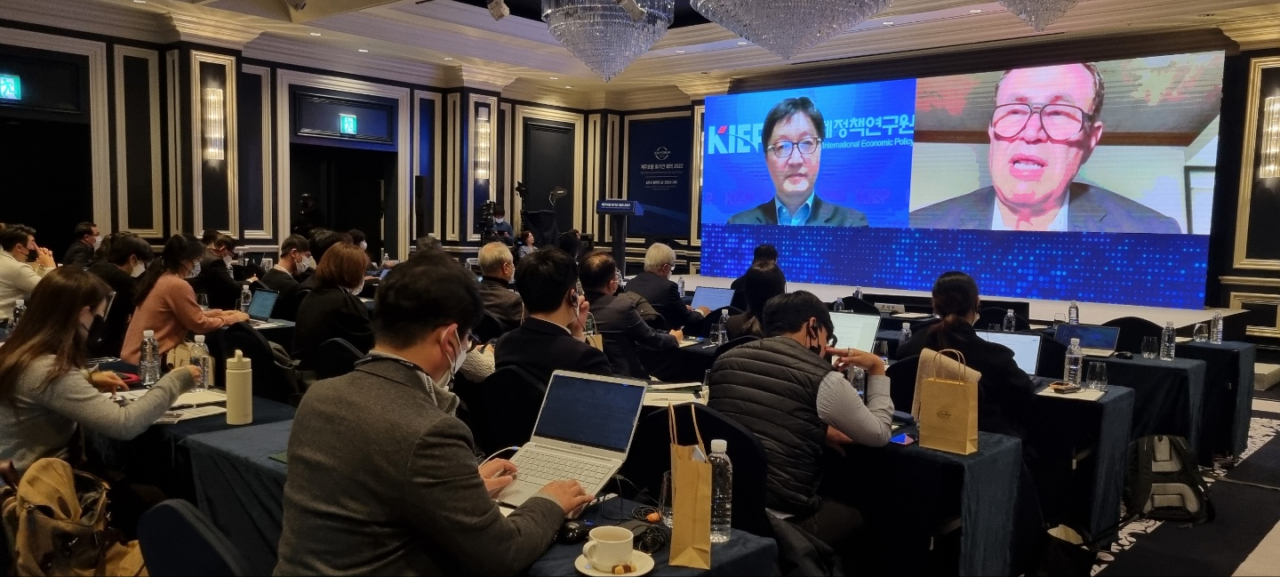‘Dr. Doom’ Roubini warns of China crisis amid ‘megathreats’
By Choi Si-youngPublished : Dec. 2, 2022 - 16:49

SEOGWIPO, Jeju Island -- Fighting off “megathreats” or an avalanche of disasters involving political, economic, financial, technological and environmental challenges will be the priority for the international community for the next 20 years, as an anti-America coalition led by China seeks out a world less dominated by the previously undisputed superpower, according to American economist Nouriel Roubini.
The emeritus professor of economics at New York University -- who is better known as “Dr. Doom” for predicting the 2008 financial crisis -- singled out China, Russia, North Korea and Iran as revisionist powers increasingly challenging the ways the world has worked since the end of World War II in 1945.
“The US-China cold war is becoming colder by day,” Roubini said virtually at a forum Friday hosted by the Jeju Forum for Peace and Prosperity, a local organization committed to enhancing South Korea’s ties with the world.
The US-China tech rivalry, the Russia-Ukraine war and nuclear ambitions pursued by North Korea and Iran are accelerating deglobalization -- forcing countries to seek local solutions rather than intergovernmental cooperation while fueling nationalism, Roubini said.
The period between 1914 and 1945 offers a glimpse into the future, the economist noted. Events such as World War I, the Spanish flu, the Great Depression and financial troubles that occurred during this period is a microcosm of the world as it is today.
Advances in unique modern day achievements such as artificial intelligence, robotics and automation all add to a dystopian outlook because they would not only destroy jobs, but open the door to mankind’s enslavement to robots, Roubini added, saying an “environmental apocalypse” is just as likely, unless efforts are doubled to reduce gas emissions and protect ecosystems. Destabilized ecosystems render a second coronavirus pandemic more likely, according to Roubini.
For South Korea -- an export-led economy highly sensitive to changes in the global economy -- the multiple threats are actually an opportunity, said Kim Heung-chong, president of the Korea Institute for International Economic Policy.
The state-backed think tank chief said Korea needs to “think outside the box” to put together a more expansive strategy to safeguard its political and economic interests. The latest Indo-Pacific strategy unveiled by the Yoon Suk-yeol administration should involve reaching out to partners beyond the region, like Canada and Latin America, according to Kim.
Economically, Korea should come up with plans to remake its economy as a key sourcing destination, Kim added, stressing Asia’s fourth-largest economy does not have to be “the location,” but one of the alternatives, at least.
“Survival diplomacy won’t cut it. We need to step up if we want to get ahead in the race,” Kim said, referring to when Korea was less invested in global affairs, choosing to focus its time and resources on growing its economy after the 1950-53 Korean War.









![[Kim Seong-kon] Democracy and the future of South Korea](http://res.heraldm.com/phpwas/restmb_idxmake.php?idx=644&simg=/content/image/2024/04/16/20240416050802_0.jpg&u=)










![[Today’s K-pop] Zico drops snippet of collaboration with Jennie](http://res.heraldm.com/phpwas/restmb_idxmake.php?idx=642&simg=/content/image/2024/04/18/20240418050702_0.jpg&u=)